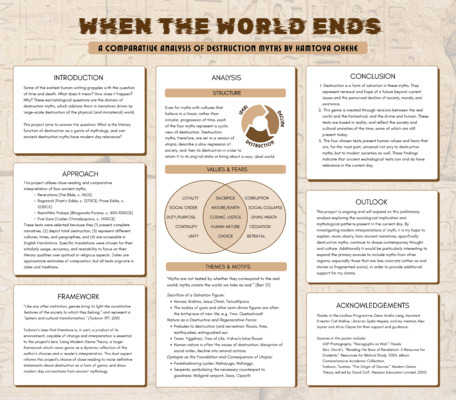About Kamtoya Okeke
Hi! I’m Kamtoya Okeke (she/her). I’m a sophomore at Columbia University planning to study Cognitive Science, focusing on Economics and Human Behaviour. My research is focused on destruction myths, stories which depict the end of the world, and I explore how these myths reflect societal values and fears, as well as how they showcase the power of storytelling.
Feel free to reach out if you're interested in literature research and/or narrative forms, or just want to chat!

Recent Comments
You make a good point! Contextualising sources often feels like the majority of work, and I think it's very interesting that you've shifted to focus on a different political theorist. I can understand how challenging it must be to do all this background research, especially when working with theory. It'll be intriguing to see how this choice to narrow your impacts your research.
Thank you for sharing, Anjelica! Looking at media is a very interesting and important way to combine both qualitative and quantitative aspects of your research in a way that is very effective. I have also been looking at narratives (albeit mythology, rather than reality), and I was wondering if your focus is on gathering the information and presenting data, or if you're looking to create an exemplar framework by which these stories can be transformed.
I can definitely see the difficulties with using a database with a limited scope in terms of region and cultural background. It's really interesting to see how you're navigating that issue and how transparent you are about the way this impacts the way you are doing your research. How do you think this might shape your project?
Kamtoya, I really resonate with what you've said on the immense volume of resources that you have to analyse. I'm wondering what a good book review is in your opinion. How have you been able to separate subjectivity in the reviews you analyze and from objectivity?
That is such a great question, Anjelica. Determining a good book review is something I can't quite do without some expertise on the subject and the book myself, so it has been more important for me to read as many reviews as possible, and get an understanding the general consensus of experts. I'm not sure there is such a thing as an unbiased reading, even for the reviewers, but in all honesty, that works in my favour when I'm comparing the different valences of the text in both historical and modern-day interpretations.
This is really cool! It's definitely really exciting to see the way the connections between different subjects and field line up, sometimes without us even expecting it. I wasn't expecting to learn so much in just the last week—not just on the my research topic, but also in terms of how to be a problem-solver, how to take advantage of the resources around me, and organising my research.
I am also really interested in neuroscience, so I'm excited to hear what you find out!
1. Being able to learn from Pamela Sohn and listening and contributing to the conversations about leadership values, skills, and types have been quite eye-opening for me over the past few days. Although I have been previously exposed to the various skills and values at different levels, given my involvement with leadership and leadership development programs, I must admit that framing things in such a manner was new for me. The four leadership styles, especially of one’s inner compass and also being a leader from behind, are great frameworks that I hope to continue developing, especially when I think about what leadership is. Furthermore, I thought the self-assessments were interesting, and I learned much more about myself and how I view leadership. The assessments also helped me to become cognizant of the areas in which I hope to grow my leadership style and skill set. For example, I want to implement more driver characteristics in group settings in addition to continuing to develop other communication styles, including the one I am most comfortable with.
2. One way I plan to implement the leading within aspect of the Co-Active Leadership Model is by keeping myself accountable and my intentions aligned with the ultimate goal of my project. As this summer we are largely working by ourselves on our projects, I hope to utilize my time efficiently and effectively to be able to produce worthy research for my community, a community in need of a voice in academia. Furthermore, by working on this specific way of leadership, I hope to build myself and my intentionality with ethicality in mind.
3. I am most excited about being able to connect more with the NYC community through this research project, especially NYC’s Afghan population. There are so many beautiful and meaningful narratives of people who migrated to the US, and NYC specifically, because of the hardships they faced in a war-torn country, and I am grateful for the opportunity to be able to bring these stories to light and give them a platform to share experiences that have shaped my community since the onset of the Soviet-Afghan War.
I definitely agree with your point about how much we learned about ourselves from the self assessments. I also think it was interesting to see, particularly with the values assessment, how we also learned from the choices we didn't make. For example how few people had status as their first value, despite many of us acknowledging how it factored into our college decision and likely would in the future.